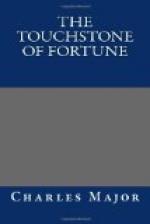“Yes, but far more, he is the friend of my king, and will make entreaty with my monarch for my return to France,” answered De Grammont.
“It was because of Count Hamilton’s insulting reference to his brother that I used the ugly word,” I returned.
“A-ah, that is different!” Then recovering himself quickly: “But I undertook the mission. It is to finish. Monsieur George Hamilton? My friend? My king’s friend? If it had been known to me! But you have the message of ’Sieur le Comte.”
After a short silence he said, “When Monsieur le Comte Hamilton returns, I shall ask him to relieve me of this duty.”
As De Grammont was leaving my closet, he paused at the door, and, after a moment’s hesitancy, whispered:—
“You may expect a letter from France soon. It will come from M. l’Abbe du Boise, who I hope will come soon to London on the business of my king. You know him not—M. l’Abbe?” The eyebrows lifted questioningly. “No? You soon will know him, yet you will not know him. You and perhaps a lady may help him in his mission. I, too, shall help him, but I, too, know him not. Yet I know him. If he succeed in his mission, he will be rich, he will be powerful. And I? Mon Dieu, my friend! If he succeed, my decree of banishment from Paris—it will be to revoke. I may return once more to bask in the smile of my king. You must not speak; the lady must not speak; I must not speak when Monsieur l’Abbe comes, nor before. It is to silence. Stone walls have one ear.”
“Two, sometimes, count,” I suggested, laughing.
“Yes, I should have said one ears! Non, non! I forget this damnable tongue of yours! When I arrive to great interest, it is to talk faster than it is to think, and—” A shrug of the shoulders finished the sentence.
“Let us speak French hereafter, my dear count,” I suggested.
“Mon Dieu, mon Dieu! It is to me more of pain to hear my sweet language murdered than to murder yours,” answered Grammont, seriously.
“Ah, but I speak French quite as well as I speak English. Perhaps I shall not murder it,” I replied.
“Perhaps? We shall try,” he said, though with little show of faith.
I began speaking French, but when I paused for his verdict, he shrugged his shoulders, saying:—
“Ah, oui, oui! It may be better than my English.” But notwithstanding his scant praise, we spoke the French language thereafter.
The count bowed himself out and left me to decipher, if I could, the problem of M. l’Abbe du Boise. Presently I discovered the cue. The Abbe was George Hamilton, and for the moment my heart almost stopped beating. If he should come to England on the French king’s business, which could be nothing more nor less than the Dunkirk affair, and should be discovered, there would be a public entertainment on Tyburn Hill, with George as the central figure.
When I found a spare hour, I hastened to see Lilly and came upon the good Doctor among the stars, as usual. There was a letter for me from Hamilton. It was short and in cipher:—




